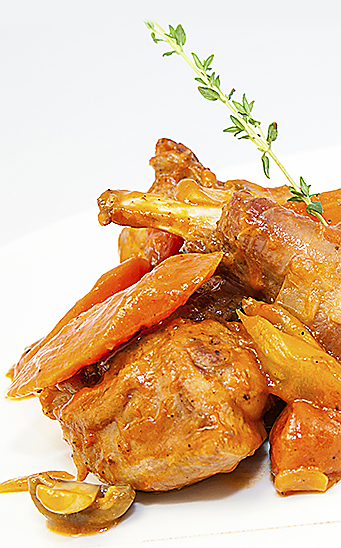
Rabbit meat
Rabbit meat, rich in protein
Rabbit meat is highly valued for its nutritional and organoleptic properties (flavor, aroma and texture). It is considered a lean or “white” meat, not because of its lower amount of myoglobin (protein that gives meat its color), but rather because of the quantity and quality of its fat.
- Energy . It is a low calorie meat . It only contributes about 130 kcal per 100 g.
- Water . Water is its majority component and constitutes 72% of it. This water content varies depending on the breed and the type of diet the animal has had.
- Carbohydrates . Rabbit meat hardly contributes carbohydrates .
- Proteins . Without a doubt, it is its most remarkable component, from a nutritional point of view. Rabbit meat provides proteins of high biological value , which contain all the essential amino acids that the body needs in the different periods of life. Its content ranges between 18 and 20 g of protein for every 100 g of meat. In addition, it is an easily digestible and very tender meat, due to its low collagen content. Its uric acid and purine content is lower than that of other meats, such as pork, beef, turkey or hare, with which it is sometimes compared. For this reason, rabbit meat is highly recommended for those who are prone to hyperuricemia and / or gout, due to its lower content of uric acid and purines.
- Fat . It is a lean meat, low in fat (no more than 5%) and in cholesterol . Its lipid profile is quite balanced, with a lower proportion of saturated fat compared to other types of meats, which is why it is recommended in obesity and cardiovascular disease prevention diets. However, its fat content may vary depending on the species, breed, age, sex or type of piece to be consumed and the diet that the animal has had.
- Vitamins . Its richness in vitamins of group B stands out , such as vitamin B12, niacin (B3) and pyridoxine (vitamin B6), and in vitamin E, with antioxidant properties, protecting cells from aging.
- Minerals . It provides significant amounts of iron, zinc and magnesium , and is low in sodium. Its iron, in heme form, is easily assimilated by the body. Its low sodium content makes it more suitable for people with hypertension problems.
Rabbit meat, an ally in the kitchen
Rabbit meat is a food of great gastronomic versatility and, therefore, admits a wide variety of culinary preparations. It can be prepared roasted, baked, grilled, sautéed, sautéed with vegetables, stewed, boiled, marinated, stewed, confit, fried … and it can either participate as a starter or as an integral part of the main dish, alone or accompanied by Garrison. It goes perfectly with a multitude of aromatic herbs (bay leaf, parsley, thyme, rosemary, dill, etc.) which, in turn, enhance its organoleptic qualities, with nuts, mushrooms, vegetables, rice, legumes, etc.
It is very important to choose healthy ways of cooking to enjoy tasty, juicy, healthy meat that is also economical, compared to other foods . In Spanish gastronomy, there are endless recipes for dishes where the rabbit is present: rabbit with garlic, potatoes stewed with rabbit, paella with rabbit, rabbit with snails, with almonds, with clams, with lemon, with rosemary …
At the time of purchase, it must be borne in mind that the rabbit, which is acquired in butchers, is farm-raised. When buying rabbit meat, choose young specimens , three to five months old, with a short neck, round and bulging knees, and muscular meat.
Rabbit: nutritional recommendations
For the Spanish Arteriosclerosis Society , rabbit meat can be consumed daily . For its part, the Spanish Community Nutrition Society (SENC) recommends 3-4 servings a week of lean meats, such as rabbit, alternating its consumption with other meats, such as chicken, turkey or beef.
Rabbit meat is perfectly integrated in the context of a healthy diet, due to its composition. Low in fat and calories and high in protein, rabbit meat is especially recommended for children, adolescents, the elderly and population groups with high protein needs , such as pregnant women or athletes. In addition, it is indicated in people with overweight, anemia, hypertension, high cholesterol, gout and people with a delicate digestive system, as it is a highly digestible and nutritious meat.
Learn more about rabbit meat
Rabbit meat has been consumed since ancient times . The rabbit was already highly appreciated in ancient times by the different civilizations that inhabited the Mediterranean basin . The term Hispania , with which the Romans called the Iberian Peninsula, comes from a Phoenician word that alluded to it as a “land rich in rabbits . ” In fact, Roman narrators referred to Hispania as a cuniculous peninsula and in some coins minted in Hadrian’s time Hispania was depicted as a seated lady with a rabbit at her feet.
Rabbit meat was one of the most appreciated and consumed by the Pharaonic court , especially in the great festivities. It was part of their funeral rituals and it was customary to include it as one of the foods that accompanied the mummy of the deceased, to serve as food in the afterlife.






















+ There are no comments
Add yours